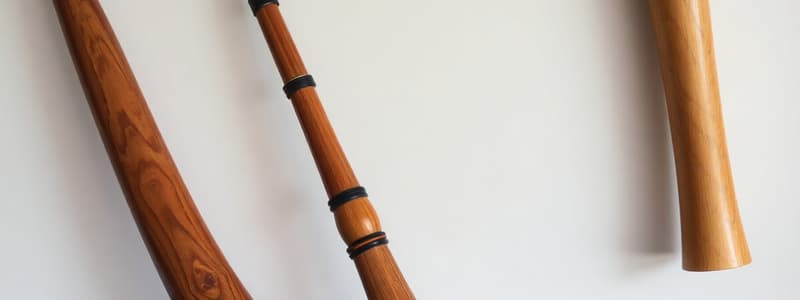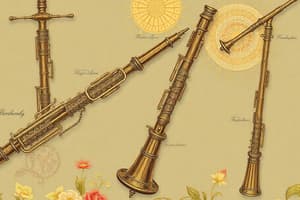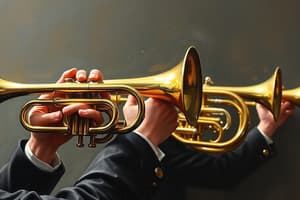Podcast
Questions and Answers
Which wind instrument, originating before the 13th century, is known for its portability and association with nomadic cultures?
Which wind instrument, originating before the 13th century, is known for its portability and association with nomadic cultures?
- Flageolet
- Shawm
- Surnai (correct)
- Zummara
The development of which modern wind instrument can be traced back to a medieval ancestor made from a single piece of wood?
The development of which modern wind instrument can be traced back to a medieval ancestor made from a single piece of wood?
- Clarinet
- Bassoon
- Oboe (correct)
- Flute
Which wind instrument, traditionally associated with South American music and played still today, creates sounds reminiscent of the Andean condor soaring over the mountains?
Which wind instrument, traditionally associated with South American music and played still today, creates sounds reminiscent of the Andean condor soaring over the mountains?
- Quena
- Panpipes (correct)
- Zampoña
- Siku
Characterized by a bird-like sound and commonly used in 17th and 18th-century dance accompaniment, which wind instrument may have either single or double pipes?
Characterized by a bird-like sound and commonly used in 17th and 18th-century dance accompaniment, which wind instrument may have either single or double pipes?
Which double reed instrument comprises two cane pieces tied together and has a counterpart known as the largest woodwind instrument with the lowest pitch?
Which double reed instrument comprises two cane pieces tied together and has a counterpart known as the largest woodwind instrument with the lowest pitch?
What ancient wind instrument, dating back to approximately 2700 BCE, features two parallel pipes, each with its own single reed?
What ancient wind instrument, dating back to approximately 2700 BCE, features two parallel pipes, each with its own single reed?
Which wind instrument is described as a 'loud folk oboe'?
Which wind instrument is described as a 'loud folk oboe'?
What is the name given to the music produced by the panpipes?
What is the name given to the music produced by the panpipes?
How many holes does a surnai typically have?
How many holes does a surnai typically have?
From what material are Panpipes traditionally made?
From what material are Panpipes traditionally made?
Flashcards
Zummara
Zummara
A double clarinet from Egypt with parallel pipes and single reeds.
Surnai
Surnai
A loud folk oboe from Mongolia, popular for celebrations, with seven holes and a thumb hole.
Flageolet
Flageolet
A French instrument from the 16th century, often used in dance music, with single or double pipes.
Shawm
Shawm
Signup and view all the flashcards
Bassoon
Bassoon
Signup and view all the flashcards
Panpipes
Panpipes
Signup and view all the flashcards
Double Reed
Double Reed
Signup and view all the flashcards
Single Reed
Single Reed
Signup and view all the flashcards
Nomadic Music
Nomadic Music
Signup and view all the flashcards
Historical Instruments
Historical Instruments
Signup and view all the flashcards
Study Notes
Wind Instruments of the World
- Zummara (Egypt): A double clarinet with parallel pipes, played since 2700 BCE. Players use their fingers to cover holes on each pipe simultaneously.
Surnai (Mongolia)
- Originated before the 13th century.
- A loud, folk oboe.
- Has seven holes and a thumb hole on the back.
- Portable and popular with nomadic people used at ceremonies like weddings.
Flageolet (France)
- Developed in the 16th century.
- Can have single or double pipes.
- Popular accompaniment for dances during the 17th and 18th centuries.
- Played with both hands creating a bird-like sound.
Shawm (Germany)
- From the late 13th century.
- Made from a single piece of wood.
- Produced in different sizes.
- Ancestor of the modern oboe.
Bassoon (Germany):
- Dating back to the 1800s.
- Constructed from a double reed (cane).
- A large instrument in the woodwind family.
- The lowest-pitched instrument of the group.
Panpipes (South America)
- Prehistoric origins in South America.
- Bamboo strips of varying length used in rows.
- Played together to create specific sounds.
- Known as sikuri.
Studying That Suits You
Use AI to generate personalized quizzes and flashcards to suit your learning preferences.




